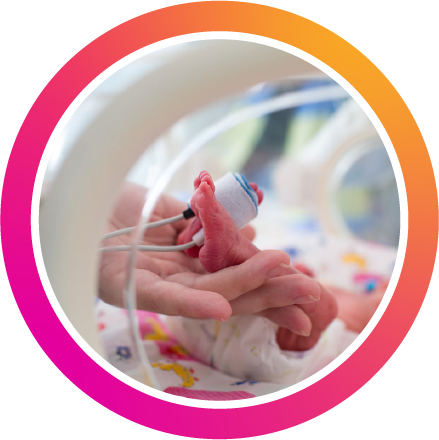Chicago, IL 60601
FREE CONSULTATIONS 312-462-4200
TOLL FREE 833-462-4200
Have You Suffered a Birth Injury?
Assistance With Birth Injuries to Children and Mothers in Illinois and Throughout the U.S.
Even though thousands of children are born every day in the United States, the process of pregnancy, labor, and delivery must be handled carefully, as both children and mothers may suffer serious injuries. Birth injuries may occur because of conditions that exist during pregnancy, complications during delivery, or for a wide variety of other reasons. These injuries can have a life-long impact on a family, and parents should be aware of the potential injuries that can occur, the treatments that will be needed, and their options for receiving financial assistance.
Cerebral Palsy
Birth injuries can lead to this developmental disorder, which may result in life-long disabilities.
Brain Injuries
Damage to a child's brain can result in intellectual disabilities and developmental disorders.
Birth Injury to Baby
An infant may be injured during pregnancy or birth for a variety of reasons, and medical personnel should be aware of the risk factors that are present and address any complications that may arise. Some common causes of birth injuries include labor induction, prolonged labor, meconium aspiration, the use of forceps or vacuum extraction during delivery, and medication errors. A child may also suffer an injury because of complications related to breech birth or Cesarean delivery. During labor and delivery, doctors and nurses should closely monitor both the mother and the child and respond promptly to signs of fetal distress or any other concerns. Failure to take the proper steps to protect the safety and health of the baby and mother may be considered medical negligence.

Birth Injury to Mom
Most modern hospitals have facilities that allow personnel to respond quickly to any issues that threaten injury to a fetus. Unfortunately, the same level of care is often not provided for mothers, and doctors and nurses may not be prepared to address complications that may threaten a mother's health during pregnancy and birth. Issues such as preeclampsia or amniotic fluid embolism may pose serious threats to a mother's health, and during delivery, mothers may suffer injuries such as uterine rupture, vaginal lacerations, or post-partum hemorrhaging. These issues can lead to long term health problems, disability, or death.
| 700 | Mothers DieDuring childbirth each year in the United States |
| 63% | Of Maternal DeathsAre preventable if medical issues are addressed correctly |
Maternal Death
The infant mortality rate has fallen over the past several decades, but shockingly, the rate of maternal death in the United States has increased significantly over the same period. In fact, at 26.4 deaths per 100,000 births, the maternal mortality rate in the U.S. is far higher than in any other developed country. Maternal death can occur for a variety of reasons, including failure to respond to complications during pregnancy or delivery, medication errors, infections/sepsis, post-partum hemorrhaging, or undiagnosed heart conditions.
Fetal Death
The loss of a pregnancy before 20 weeks is considered a miscarriage, and this may occur because of genetic abnormalities, uterine complications, medication errors, or maternal infections. The death of an infant after the 20th week of pregnancy is considered stillbirth, and it can take place because of physical trauma to the mother, placental abruption, pregnancy issues such as preeclampsia, or complications during delivery. Doctors should be aware of the risk factors for fetal death and take steps to address these issues and prevent the death of the fetus.
Cerebral Palsy
Cerebral Palsy, or CP, is a developmental disorder that affects a person's ability to control their muscles, and it may also lead to issues with vision, hearing, speech, or intellectual disabilities. CP often occurs because a child experiences a brain injury during birth, and depending on the severity of the condition, a person may experience life-long disabilities, and ongoing medical treatment, physical therapy, occupational therapy, assistive devices, and support services may be required. The lifetime costs of caring for a child with CP can be very high, and parents will want to understand their options for receiving financial help for their child.
 |
Types of Cerebral Palsy |
 |
Causes of Cerebral Palsy |
 |
Diagnosis and Treatment |

Frequently Asked Questions
Could My Birth Injury Have Been Prevented?
While some birth injuries are unavoidable, many are preventable if the proper medical care is provided. During pregnancy, a doctor should address any risk factors for fetal or maternal injuries. During labor and delivery, the mother and child should be properly monitored, and any complications should be addressed immediately.
What Causes Infant Brain Injuries?
Brain injuries that occur during pregnancy or childbirth are often caused by asphyxia, or a lack of oxygen to the child. This may occur because of problems with the placenta or umbilical cord or complications resulting from labor induction or prolonged labor. Trauma during birth can also lead to skull fractures and other complications that can damage a child's brain.
How Common Is Cerebral Palsy?
Cerebral Palsy (CP) affects around 1 in every 323 children in the United States. In many cases, a child experiences CP because of brain injuries that occurred during birth. However, the condition often is not diagnosed until a child is between the ages of three and five. Parents should be sure to understand the potential causes of CP and the treatments that are available.
What Types of Injuries Can Occur When Labor Is Induced?
Labor may be induced for a variety of reasons, ranging from medical necessity to convenience. However, it comes with some risks, especially when Pitocin is used to induce contractions. This drug can cause uterine hyperstimulation and intense contractions, which may lead to asphyxia, placental abruption, uterine rupture, or post-partum hemorrhaging.

-
My mother had a very greatful experience. My mother had questions, they returned her phone call promptly. They made us feel like we were family. Next time, I will definitely hire the Allen N. Schwartz Law firm.Thank You!!
- Satisfied Customer
From Our Blog
Can I Sue if My Baby Was Injured in the NICU?
February 10, 2026
The purpose of the neonatal intensive care unit (NICU) is to ensure that prematurely born or ailing newborns get the treatment they need. Unfortunately, some hospitals end up falling short of their responsibility to newborns in need. If your baby was injured in the NICU due to a preventable error,...
Are Nurses Ever Liable for Birth Injuries in Illinois?
January 11, 2026
Mothers need around-the-clock attention during childbirth to avoid injury. Doctors and other medical personnel have a responsibility to make sure the process goes as smoothly as possible, but in the worst case scenario, the mother or baby could end up seriously hurt. Sometimes, these injuries can be traced back to...
When is Forceps or Vacuum Use Necessary During Delivery?
December 11, 2025
The birth of a child should be one of the happiest moments in a family's life. However, when labor does not progress as expected, doctors may recommend using forceps or a vacuum to assist with delivery. These instruments can help bring a baby safely into the world when used correctly...





